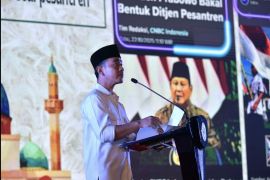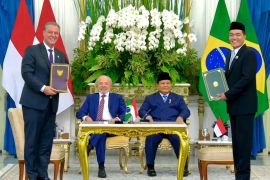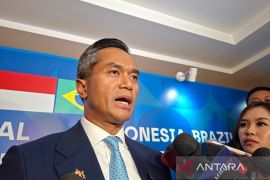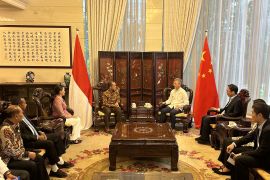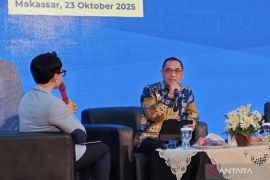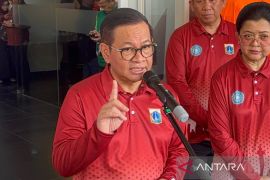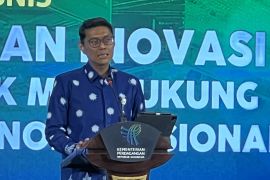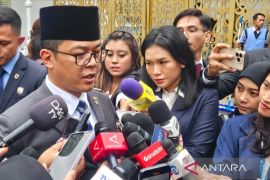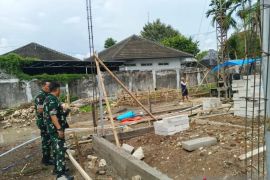Indonesia continues to encourage developed industrialized countries to play more role while Indonesia has to increase its ambition to make a real and immediate action concerning the climate change issue.Jakarta (ANTARA News) - In relation to mitigating the adverse impact of climate change, Indonesia has been implementing a number of proper actions.
It is because the country is committed to be proactive and part of a global solution to climate change.
In its effort to solve the climate change issue, Indonesia has managed to improve tropical forest management with intensive monitoring, assessment and law enforcement; and enhance people movement on tree planting and water saving across the country.
Indonesian Ambassador to Germany Eddy Pratomo, the chairman of of Indonesian delegation to the United Nations Framework Convention on Climate Change (UNFCCC) in Bonn, Germany from June 3 to 14, 2013, said his country has done various efforts as part of its contribution to control climate change.
Indonesia, according to Pratomo, continues to encourage developed industrialized countries to play more role while Indonesia has to increase its ambition to make a real and immediate action concerning the climate change issue.
During the UNFCCC in Bonn, he said Indonesian delegation explained various efforts the country had done as a developing country to contribute to climate change control.
Meanwhile, Indonesia`s Berlin Embassy spokesman Ayodhia Kalake said on Saturday that during the meeting in Bonn the partner countries signed UN Convention to discuss a new legal framework to control climate change to be adopted in 2015 and implemented starting in 2020.
Kalake said that during the UNFCCC in Bonn, Indonesian delegation explained various efforts to control the climate change.
Indonesia admitted that the efforts were not simple matters because of limited funds and capacity.
"But Indonesia stated that it has a strong national commitment and that it should be supported internationally in the form of funds and technology," he said.
Besides the UN Convention, the global climate change control relies on Kyoto Protocol which requires industrialized countries to reduce green house gas emission.
The partner countries discussed increased action of emission reduction, adaptation to the horrific impacts of climate change, and provision of funds and technology for developing countries from 2013 to 2020.
A workshop held during the Bonn session examined the issue of coordination of support for actions taken by developing countries to reduce emissions related to the forest sector, known as REDD+ activities.
Within the mechanism of REDD+, Indonesia committed to optimize utilization of the existing and potential agricultural lands, including the rehabilitation and utilization of abandoned agricultural lands.
According to the Executive Secretary of the UNFCCC, Christiana Figueres, the global concentration of heat-trapping carbon dioxide in the atmosphere is at its highest ever, which has already passed the 400 parts per million mark.
Therefore the UN climate change body has warned that a stepped-up coordinated response was needed to fend off the impacts of climate change after the world`s carbon- dioxide concentration surpassed its highest level in 4 million years.
The new measurement came from Mauna Loa, a volcano on the big island of Hawaii that has been monitoring the worldwide trend on carbon dioxide.
Figueres called for a greatly stepped-up response to climate change by all parts of society and said "a new danger zone" was ahead.
Therefore the Bonn session was held for the next round of climate change talks under the umbrella of the UNFCCC with a central
focus of the talks was on negotiations to build a new global climate agreement and to push for greater immediate climate action.
During his visit to the the National Center for Atmospheric Research, in Boulder, Colorado, last Friday, UN Secretary-General Ban Ki-moon reiterated his commitment to mobilize highest-level political will to deal with climate change.
At the research center, Ban told the audience that he has visited the Antarctic and Arctic, the Brazilian rainforest and the dry lands of Mongolia, and has attended every United Nations climate change conference since he took office.
The UN chief announced that he would convene a high level meeting of world leaders next year to mobilize political will for a universal, ambitious and binding climate change agreement by 2015.
"Over the next two years, I will engage leaders at the highest level from governments, business, finance, science and civil society and harness the full strength of the UN system to catalyze ambitious action to reduce emissions and strengthen climate resilience," Ban said.
Meanwhile, Executive Chair of National Council on Climate Change Rachmat Witoelar said March 27, 2013 that Indonesian media should play more role in climate change issue.
"I do believe that the press has a critical role in shaping our dialogue towards stakeholders engagement in promoting green initiatives and public`s views and informed opinions on climate change," he said.
According to him, the roots of climate change were anthropogenic, hence the man-made problems needed to be unmade by man.
"Thus, media has significant role to harness the knowledge, power and interest of the public to be more aware of the climate change problems," he said.
He noted that the media would be able to educate and promote the important issues of climate change both from the top-down and the grassroots.
"Hence, stakeholders of all levels rely on the partnership of the media to spread the message of climate change problems and solutions to the citizens in the language that the public can understand and digest," he explained.(*)
Reporter: Otniel Tamindael
Editor: Heru Purwanto
Copyright © ANTARA 2013


